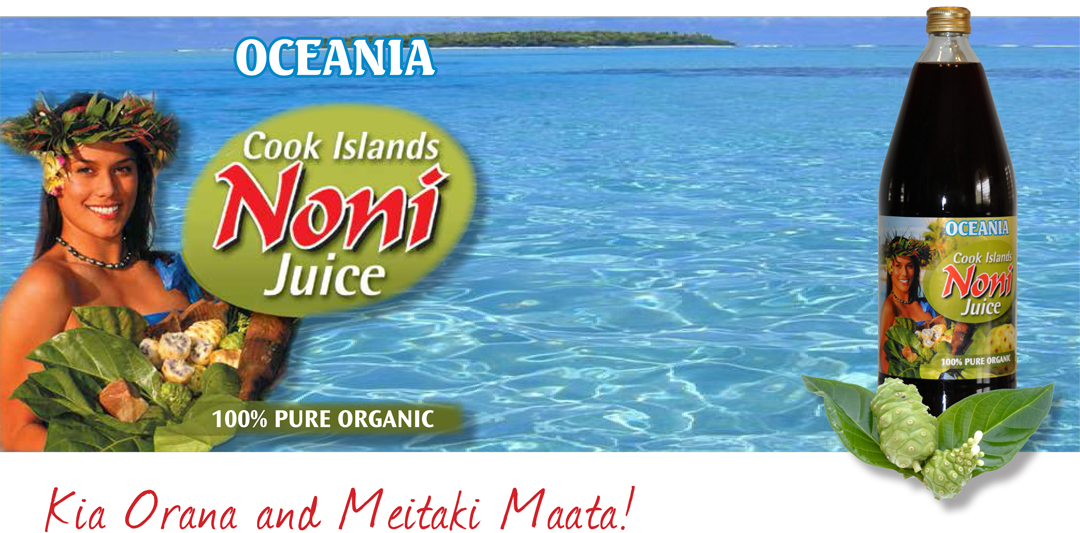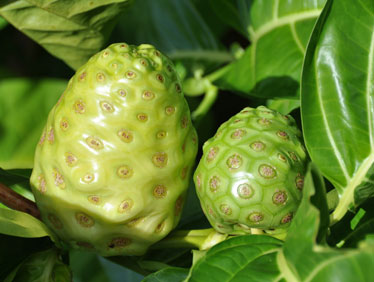
About Noni
 Polynesians have always taken this sacred plant with them in their travels from island to island, from the time of the great migrating canoes seeking new lands in which to live. Their knowledge of celestial navigation was amazing and they made long voyages guided only by the stars, the waves and the winds. Noni is commonly known as Morinda citrifolia. The Noni plant is an evergreen shrub that can range from a small bush to a 15-30 feet tall tree. It grows leaves that are a dark green glossy colour and white flowers with a bumpy, potato like fruit. The fleshy fruit is noted for its strong rancid, cheesy smell when ripe. This smell decreases as the fruit is fermented and the juice is prepared. The taste is also improved during this processing.
Polynesians have always taken this sacred plant with them in their travels from island to island, from the time of the great migrating canoes seeking new lands in which to live. Their knowledge of celestial navigation was amazing and they made long voyages guided only by the stars, the waves and the winds. Noni is commonly known as Morinda citrifolia. The Noni plant is an evergreen shrub that can range from a small bush to a 15-30 feet tall tree. It grows leaves that are a dark green glossy colour and white flowers with a bumpy, potato like fruit. The fleshy fruit is noted for its strong rancid, cheesy smell when ripe. This smell decreases as the fruit is fermented and the juice is prepared. The taste is also improved during this processing.
For more than 2,000 years, the juice of the Noni fruit has been widely used as herbal medicines by ancient healers of the South Pacific for a myriad of nutritional and sustenance purposes. It was also traditionally used to cleanse and purify, as a remedy against illness, as a wellbeing tonic, to aid digestion, to heal abrasions and to reduce aches and pain.
Noni is emerging as one of the best and most diverse natural remedies currently available today. Scientific studies have validated the unique and varied health benefits of this miraculous plant. There are many natural chemical compounds in the pure Noni fruit that are likely responsible for it’s unique medicinal effects. Some of the health-related ingredients of Noni fruit that have been isolated are Morindine, Morindone, Acubin, Terpene compounds, L. Asperuloside, various Anthraquinones, Alazarin, Caproic Acid, Caprylic Acid, Scopoletin, Damnacanthal, and Alkaloids.
Alkaloids are colourless, complex, bitter organic bases, and are essential to maintaining healthy stasis in the body. Dr. Ralph Heinicke, a respected biochemist formerly from the University of Hawaii, has dedicated himself to the study of one alkaloid in particular found in Noni called xeronine. The body produces xeronine in order to activate enzymes and to regulate and give structure to proteins. According to Dr. Heinicke, without xeronine, life would not exist. However extracting xeronine from the human body has been impossible to date. The body’s protein molecules consume the alkaloid immediately after it is created; and therefore, there is never an appreciable, insoluble amount in the body.
Even though the Noni fruit has only negligible amounts of xeronine, the juice does contain very large amounts of a precursor to the essential alkaloid called proxeronine. Proxeronine is a colloid that, unlike most colloids, contains neither sugars, amino acids, nor nucleic acids and thereby has been overlooked by most biochemists. This compound initiates the release of xeronine in the intestinal tract after it comes in contact with a specific enzyme which is also contained in the noni juice. This particular chemical combination is believed to significantly affect cellular function, which can determine a whole host of physiological reactions. The enzymatic reactions that occur with taking Noni juice on an empty stomach are what Dr. Heinicke believes set cellular repair into motion.
For more information and product specifications, please contact us.
